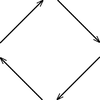Literature/1975/Hacking
< Literature < 1975| Authors | ||
|---|---|---|
|
A B C D E F G H I J K L M N
|
| |
Excerpts
- Ideas were once the objects of philosophizing, and were the link between the Cartesian ego and the world external to it. Connections between ideas were expressed in mental discourse, and formed representations of reality in response to changes in the ego's experience and reflection. In today's discussion, public discourse has replaced mental discourse. An unquestioned ingredient of all public discourse is the sentence. If it were not for a few technical niceties, philosophers nowadays would say about 'sentence' what Port Royal once said about 'ideas', that the word is too simple for definition. The sentence is the simple object taken as fundamental in the explanation of truth, meaning, experiment, and reality. Quine has said that 'the lore of our fathers is a fabric of sentences'. The sentences in this fabric of public discourse are an artefact of the knowing subject. Perhaps, as I shall soon suggest, they are responsible for the representation of reality in a body of knowledge. So sentences appear to have replaced ideas. (p. 159)
Figures
- Figure 1 (p. 165)
| Experience |
|
Idea (mental discourse) | . . . . . . . . . : : : : v (meanings?) | ||||
|---|---|---|---|---|---|---|---|
| |||||||
- Compare with w: Representationalism#Problems with the indirect theory.
- The Belgian surrealist artist René Magritte illustrated the concept of "perception always intercedes between reality and ourselves" in a number of paintings including a famous work entitled The Treachery of Images, which consists of a drawing of a pipe with the caption, Ceci n'est pas une pipe ("This is not a pipe").
- See also
- Magritte, René (1929). The Treachery of Images (La trahison des images). Los Angeles County Museum of Art, Los Angeles, California. [+]
- Barry, Ann Marie Seward (1997). Visual Intelligence: Perception, Image, and Manipulation in Visual Communication. State University of New York Press. [+]
Comments
- w: Cognitive revolution proper
Hacking argues that "public discourse has replaced mental discourse" or "sentences appear to have replaced ideas." That is, the left side or narration has replaced or trivialized the right side or ideation, or Thought on top, of the semantic triangle on the right, maybe unjustly. Along this line is Chisholm (1976) Person and Object revolting against Quine (1960) Word and Object. Figure 1 above simply details the relationship between Thought and Referent, or Person and Object. His question "why does language matter to philosophy?" rises from the fact that problematic is language in autonomy or in isolation, regardless of the cognitive, thinking or knowing, subject.
Ogden & Richards (1923) showed it up perhaps most persuasively only to be ignored. It may be that cognitive science has emerged from their thesis, but fewer and fewer acknowledge their intellectual debts to those pioneers. For example, it is simply unjust that highly celebrated Lakoff & Johnson (1980) Metaphors We Live By did not make reference to Richards (1936) The Philosophy of Rhetoric that is an extension to Ogden & Richards (1923). But, Hacking (1975) did!
What is necessary is not necessarily sufficient. Such is language, above all, contrary to the widespread common sense. It would not sufficiently reveal itself of itself so that it matters indeed so that the mind or Thought or Reference matters on top of everything else, as may be suggested by the apex of the triangle, as the ultimate mediator, as the knower of the known. So dubious is Popper's (1972) later idea of "World 3" as the place for objective knowledge without the knowing subject. So are Quine's (1960) semantic holism and Putnam's (1975) semantic externalism -- mindless of the mind! So are analytic philosophy in general and logical positivism in particular. So unavoidable was the rethinking or revolution of the world view, academic and public. Yet, it was too devastating to be accepted frankly. It had to be veiled, disguised or distorted as far as possible.
The emergence and popularity of cognitive science[1] is a hard evidence of the cognitive revolution proper, though veiled or disguised, that draws on and centers around the knowing subject and the human cognition, as opposed to the dehumanizing cognitivism such as the automated machine in autonomy or in isolation from the reality as well as mentality and morality.
In sharp contrast with the human-centered cognitive perspective, the cognitivist or computationalist perspective based on radical reductionism is not really to have to do with, but to defeat or do without, the mind or human cognition proper, to replace dearer and dearer manpower with cheaper and cheaper computer power for profit-making. The so-called cognitive revolution, if anything similar, "since 1956" must have been a cognitivist revolution giving rise to dehumanizing artificial intelligence until it came across the AI winter, such as since the late 1970s.
Chomsky's universal grammar would be another cognitivist dehumanizing case, hence a misleading claim, if any, for the cognitive revolution. Any grammar should be confined within the necessary but insufficient condition of language in isolation from the situation out there and the ideation in here. Percy (1975) proudly dubbed such a lingual irreducibility the "delta factor" that is still another new wording for the truly holist trinity of meaning.
Such is also the case with the dictionary. In this regard, Fillmore (1976) argues for frame semantics that attempts to take advantage of both the dictionary and the encyclopedia coupled so as to help better understand the meaning of words beyond the dictionary definition.
Wikimedia
Chronology
- Cohen, Jonathan (1977). The Probable and the Provable. Oxford University Press. [+]
- Chisholm, Roderick (1976). Person and Object: A Metaphysical Study. London: G. Allen & Unwin. [+]
- Hacking, Ian (1975). Why Does Language Matter to Philosophy? Cambridge University Press. [+]
- Wilson, Edward (1975). Sociobiology: The New Synthesis. Harvard University Press. [+]
- Hacking, Ian (1975). The Emergence of Probability: A Philosophical Study of Early Ideas about Probability, Induction and Statistical Inference. Cambridge University Press. [+]
- Hacking, Ian (1972) A Concise Introduction to Logic. New York: McGraw-Hill.
- Hacking, Ian (1965) The Logic of Statistical Inference. Cambridge University Press.
- Cherry, Colin (1957). On Human Communication: A Review, a Survey, and a Criticism . The M.I.T. Press, 1966. [+]
- Ogden, C. K. & I. A. Richards (1923). The Meaning of Meaning: A Study of the Influence of Language upon Thought and of the Science of Symbolism. London: Routledge & Kegan Paul Ltd. [+]
Comments
Notes
- ↑ The earliest claim for cognitive science includes: Johnson-Laird, Philip N. & Peter Cathcart Wason eds. (1977). Thinking: Readings in Cognitive Science. Cambridge University Press. [+]


